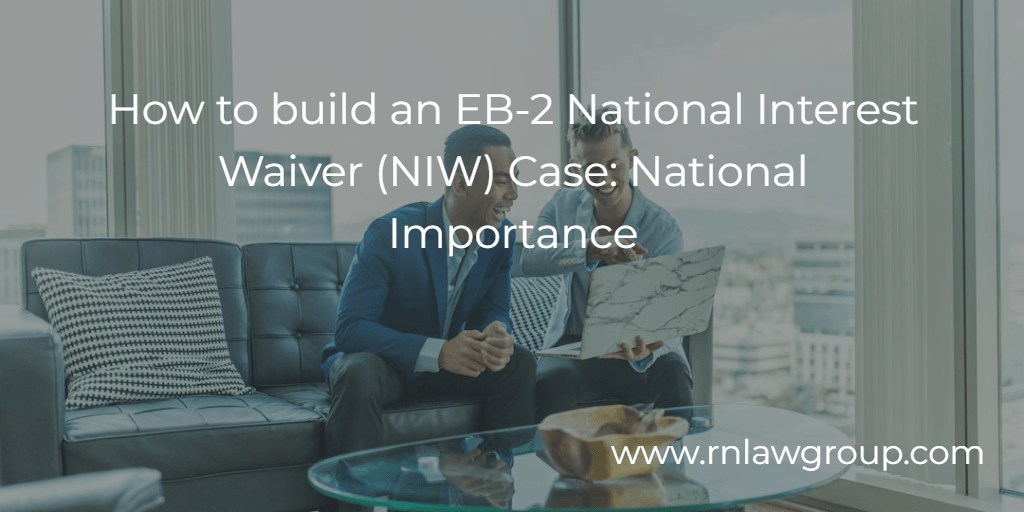
How to build an EB-2 National Interest Waiver (NIW) Case: National Importance
When crafting an EB-2 NIW case, the singular most important aspect is properly defining your area of endeavor—i.e. in line with your background, what is it that your propose to do in the United States? This “proposed endeavor” is the foundation of your EB-2 NIW case and every argument made or piece of documentation provided should support the “proposed endeavor”.
In the past, USCIS focused on the proposed endeavor’s intrinsic merit to the United States, whether it would be contrary to the national interests to waive Labor Certification requirements, and whether the Alien was well-positioned to advance that work. This framework was rigid and overly restrictive, often requiring Aliens to prove that their work was unique or groundbreaking with direct, quantifiable impact on the national interest.
Through administrative policymaking and precedent bearing decisions, USCIS has developed a new framework of analysis for NIW cases—known as the Dhanasar stand. This standard is far more flexible than previous standards. Under the Dhanasar standard, the Alien must propose an endeavor of 1) substantial merit and 2) national importance and 3) be well positioned to advance that endeavor. USCIS will then inquire whether the impact or value of the job (i.e. proposed endeavor0 to be undertaken by the foreign candidate is so heavily in the national interest that it outweighs the interests of the Labor Certification (i.e. proving there are no qualified or available US workers).
When crafting a proposed endeavor, it is important to be strategic to narrowly focus that endeavor. Why might we do this? Our view is that it makes the argument of 1) national importance and 2) substantial merit that much easier to argue.
The post-Dhanasar USCIS has ushered in a more flexible approach to National Interest Waiver (NIW) approval, providing Petitioners with increased autonomy in defining and substantiating key aspects of their cases, particularly the section pertaining to national importance in any NIW petition. A comprehensive examination of USCIS regulations, statutes, and court cases reveals the conspicuous absence of a formal definition for “national importance” within the Act or regulations. Consequently, in the absence of a statutory or regulatory definition, interpreting words based on their plain, ordinary, and literal meaning becomes imperative. This principle extends to terms like “substantial merit,” for which Congress or USCIS deliberately refrained from providing a definition, making the plain meaning the default and official interpretation.
The Supreme Court consistently emphasizes that USCIS must adhere to the language of its own regulations, whether explicitly defined or interpreted based on the plain meaning of the words. This commitment extends to the scrutiny of violations and contradictions of binding agency procedural policies. Recent federal court decisions have underscored the vitality of this doctrine, invalidating USCIS decisions that run afoul of its procedural guidelines. Thus, the refusal to apply the plain meaning of “national importance” constitutes a violation by USCIS, contrary to its own intentions, regulations, and policies, amounting to a clear breach of the law that can be legally challenged under the Administrative Procedures Act and other procedural avenues.
In the Dhanasar case, the Administrative Appeals Office (AAO) did not provide a specific definition of “national importance.” However, it outlined criteria for determining national importance, such as an endeavor’s potential national or global implications within a specific field, its capacity to employ U.S. workers, generate significant positive economic effects, or align with matters deemed of national importance by government entities or national initiatives.
To evaluate the national importance of a proposed endeavor, USCIS officers are directed to consider its potential prospective impact. While officers are tasked with this evaluation, they are advised to focus on the nature of the proposed endeavor rather than its geographical breadth. For instance, an endeavor may be deemed of national importance due to its implications within a specific field, such as improved manufacturing processes or medical advances, and its potential to generate economic opportunities, particularly in economically depressed areas.
USCIS should also consider endeavors contributing to maintaining U.S. technological leadership or peer status among allies and partners, particularly in research and development-intensive industries. This recognition is crucial, especially where activities and investments, both early and later in the development cycle, may contribute to the United States achieving or maintaining technology leadership. USCIS is mandated to consider such endeavors as those of national importance.
In assessing the “national importance” of a proposed endeavor, USCIS must inquire whether it is more likely than not that the proposed endeavor has the potential to produce prospective impact. To support a finding of “national importance,” the AAO in Dhanasar identified two key elements: the petitioner’s proposed endeavor enabling and/or strengthening the national agenda, and supporting documentation describing the importance of the endeavor to the field and/or the nation at large. This comprehensive approach ensures a nuanced evaluation of the national importance criterion in NIW petitions.
For more information, or for a detailed conversation regarding eligibility for a National Interest Waiver petition, please schedule a time to speak here.
By Ryan A. Wilck, Partner and Attorney at Law
Ryan Wilck is a Managing Partner and attorney at Reddy Neumann Brown PC with over a decade of US immigration law experience, enthusiastic and proactive in his approach assisting clients and their employees through the various phases of the permanent residency a/k/a Green Card process. “Concilio et labore” is not only the motto of Ryan’s favorite sports club but is also his life’s motto; all things come through wisdom and effort. Ryan is passionate about gaining the trust of his clients by utilizing a relentless and detail-oriented approach to understand their specific goals and concerns, hoping to instill a sense of confidence and stability. Whatever your immigration problem or interest, he and his team will find a solution, through wisdom and effort. Reddy Neumann Brown PC has been serving the business community for over 20 years and is Houston’s largest immigration law firm focused solely on employment-based business immigration. We work with employers and their employees, helping navigate the complex immigration process efficiently and cost-effective.
We are committed to assisting our clients with navigating the complex PERM Labor Certification (ETA 9089 and other challenging immigration matters as an accomplished immigration law firm in Houston, Texas. Our team is here to offer the direction and support you require, whether you’re a company trying to hire top talent or a foreign worker seeking to develop a career in the United States. To find out more about how we can help you with your immigration issues, get in touch with us right away.

